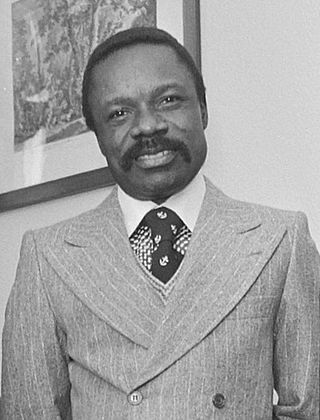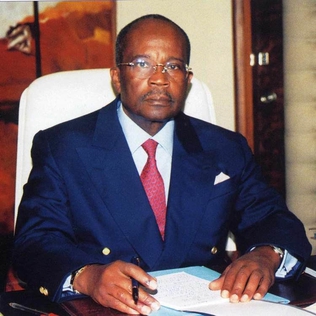 |
|---|
The Gabon of the Future (French : Gabon Avenir) is a political party in Gabon led by Sylvestre Oyouomi.
 |
|---|
The Gabon of the Future (French : Gabon Avenir) is a political party in Gabon led by Sylvestre Oyouomi.
Established by Oyouomi in 1999, [1] the party won one seat in the Senate in the 2003 elections, [2] but lost it in the 2009 elections. [3]
In 2010 the party joined the Republican Majority for Emergence, a bloc supporting the Gabonese Democratic Party. [4]

Gabon, officially the Gabonese Republic, is a country on the Atlantic coast of Central Africa, on the equator, bordered by Equatorial Guinea to the northwest, Cameroon to the north, the Republic of the Congo on the east and south, and the Gulf of Guinea to the west. It has an area of 270,000 square kilometres (100,000 sq mi) and a population of 2.3 million people. There are coastal plains, mountains, and a savanna in the east. Libreville is the country's capital and largest city.
Little is known of the history of Gabon before European contact. Bantu migrants settled the area beginning in the 14th century. Portuguese explorers and traders arrived in the area in the late 15th century. The coast subsequently became a centre of the transatlantic slave trade with European slave traders arriving to the region in the 16th century. In 1839 and 1841, France established a protectorate over the coast. In 1849, captives released from a captured slave ship founded Libreville. In 1862–1887, France expanded its control including the interior of the state, and took full sovereignty. In 1910 Gabon became part of French Equatorial Africa and in 1960, Gabon became independent.

Omar Bongo Ondimba was a Gabonese politician who was the second president of Gabon for almost 42 years, from 1967 until his death in 2009. Bongo was promoted to key positions as a young official under Gabon's first President Léon M'ba in the 1960s, before being elected vice-president in his own right in 1966. In 1967, he succeeded M'ba to become the country's second president, upon the latter's death.

The Gabonese Democratic Party is a political party in Gabon. It was the dominant political party in Gabonese politics from 1961 until 2023, when it was deposed in a coup d'état against President Ali Bongo Ondimba. It was also the sole legal party between 1968 and 1990.

Elections in Gabon take place within the framework of a presidential multi-party democracy with the Gabonese Democratic Party, in power since independence, as the dominant party. The President and National Assembly are directly elected, whilst the Senate is indirectly elected.

The Democratic and Republican Alliance is a political party in Gabon.

The Common Movement for Development was a political party in Gabon, led by Paul Biyoghé Mba.

Ali Bongo Ondimba, also known as Ali Bongo and Ali Ben Bongo, is a Gabonese former politician who was the third president of Gabon from 2009 to 2023. He is a member of the Gabonese Democratic Party. He is the son of Omar Bongo, who was president of Gabon from 1967 until his death in 2009. During his father's presidency, he was Minister of Foreign Affairs from 1989 to 1991, represented Bongoville as a deputy in the National Assembly from 1991 to 1999, and was the Minister of Defense from 1999 to 2009. After his father's death, he won the 2009 Gabonese presidential election. He was reelected in 2016, in elections marred by numerous irregularities, arrests, human rights violations, and post-election protests and violence.

The Gabonese Union for Democracy and Development was a political party in Gabon.

Jean Eyeghé Ndong is a Gabonese politician. He was the Prime Minister of Gabon from January 20, 2006 to July 17, 2009. He was also the First Vice-president of the Gabonese Democratic Party (PDG) until 2009.

Casimir Marie Ange Oyé-Mba was a Gabonese politician. After serving as Governor of the Bank of Central African States (BEAC) from 1978 to 1990, Oyé-Mba was Prime Minister of Gabon from 3 May 1990 to 2 November 1994. Subsequently, he remained in the government as Minister of State for Foreign Affairs from 1994 to 1999, Minister of State for Planning from 1999 to 2007, and Minister of State for Mines and Oil from 2007 to 2009.
Didjob Divungi Di Ndinge is a Gabonese politician who was Vice-President of Gabon from 1997 to 2009. He is the President of the Democratic and Republican Alliance (ADERE), a political party. As Vice-President of Gabon, Divungi Di Ndinge exercised presidential powers in an acting capacity from May 2009 to June 2009, while President Omar Bongo Ondimba was hospitalized.
André Mba Obame was a Gabonese politician. After serving as an adviser to President Omar Bongo in the 1980s, he was a minister in the government of Gabon from 1990 to 1991 and again from 1997 to 2009; during that time, he was identified with the reformist wing of the ruling Gabonese Democratic Party (PDG). He held the key post of Minister of the Interior from 2006 to 2009 and then briefly served as Minister of the Coordination and Follow-up of Government Action in mid-2009. He was an independent candidate in the 30 August 2009 presidential election and placed third with 25.33% of the vote, according to official results, but he claimed victory and alleged that the PDG candidate, Ali Bongo, won through fraud.
Jean-Boniface Assélé is a Gabonese politician and the President of the Circle of Liberal Reformers (CLR). He served in the government of Gabon from 1975 to 1990 and again from 2004 to 2009. He was also Commander-in-Chief of the National Police Forces from 1970 to 1989 and held the rank of General. Since September 2009, Assélé has been the Fourth Vice-President of the Senate of Gabon.
Jules-Aristide Bourdes-Ogouliguende was a Gabonese politician who was the President of the Congress for Democracy and Justice (CDJ), an opposition party. He served as a minister in the government of Gabon from 1976 to 1990 and was President of the National Assembly from 1990 to 1993; from 1993 until his death in 2018.

Early presidential elections were held in Gabon on 30 August 2009. They took place due to the death of incumbent President Omar Bongo on 8 June, after more than 41 years as the sole president of Gabon. While the constitution stated that interim President Rose Francine Rogombé should organise elections within 30 to 45 days, the Constitutional Court accepted the government's request for a delay due to the circumstances.
Pierre-Claver Zeng Ebome was a Gabonese politician and musician. He held a succession of ministerial portfolios in the government of Gabon during the 1990s and subsequently served as a Deputy in the National Assembly of Gabon. Zeng Ebome was the President of the African Development Movement (MAD), a minor political party, until February 2010, when it merged itself into the National Union; afterward he was briefly a Vice-President of the National Union from February 2010 to May 2010.
The Gabonese Socialist Union is a political party in Gabon. Initially an opposition party founded by formerly exiled student activists, the party aligned itself with the ruling majority.

The Independent Centre Party of Gabon is a political party in Gabon.
Events in the year 1999 in Gabon.